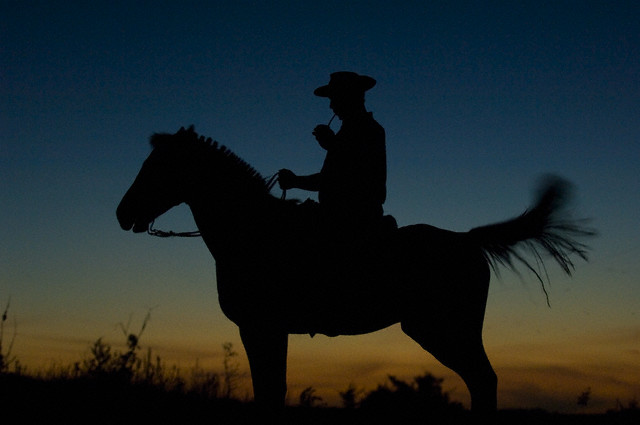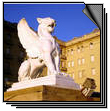Uruguay, The Free People
About the People of Uruguay.

Because they struggled so long and hard for independence, the people of Uruguay have developed a strong nationalistic feeling. Their tradition is democratic and they are possesive about it. It is almost as if they invented democracy! The Uruguayan people treasure the freedom they finaly won, and the spirit of liberty is still strong among the Uruguayans. They have a voice in their goverment, and they are practicaly guaranteed a good life because of laws that are just, and the many educational opportunities offered freely to all. Many people have immigrated to this republic, hence, Uruguay has more of a cosmopolitan air than any other Country in South America. By nature the people are friendly and unassuming. They are not only good citizens but are also good neighbors. There are more than three million people in Uruguay and the majority of Uruguayans are of European origin. They came largely from Spain, and include many Basques. There are also groups of Italians, English, German and Swiss, and often visitors to Uruguay are surprised to find so many men, women and children with light skin, blond hair and blue eyes.
When Spain established its
first fort in the Banda Oriental in Montevideo," Naturally, the people who came were of Spanish origin.
There were already Portuguese soldiers and their families living at Colonia.
The original inhabitants, the Charrua Natives, were wiped out during the
colonial period. In fact, by the time Uruguay had become a republic,
the Indians had dissapeared. They had either been killed in the wars, or
they had died out. Today, only about 5 percent of the population has any
trace of Indian or Negro blood. Traces of Indian blood are seen in the features
of those gauchos who have straight
hair and dark complexions.

After achieving independence, more immigrants came to Uruguay from
Italy and
Spain, at a time when Argentina was torn by civil strife. The newcomers
were afraid to settle on the pampas and therefore went to Montevideo
and settled along the Plata and Uruguay rivers.
In the seventy years between 1830 and 1900, the immigrants from Europe swelled
the country's population from about sixty thousand to nine hundred thousand
which created a large middle class. Most of them preferred city life to
the country, and by the beginning of the twentieth century Montevideo
had approximately one hundred thousand people.
Immigrants from Slavic countries also settled in various parts of the country.
In the 1930's, some restrictions were placed on the people wanting to enter
the country and at that time the importing of seasonal farm workers was
stopped, but during the Nazi persecution Uruguay received Jewish
refugees from Europe.
Emigration-How did it start ? (an emigrant version)
Immigration, which had produced a society 90 per cent
European and 8 per cent mestizo (mixed European and Indian), had
slowed down considerably, and in 1967 there were only 387 inmigrants. The
people had come from the following countries: Spain 144, USA 58, Argentina
47, Italy 21, Germany 20, others 97, but what officials were not aware of
was that people were leaving the country in increasingly large numbers:
3,700 in 1961, 17,000 in 1967, and that went on to progress in geometrical
proportion. Today, the goverment does not want to acknowledge the fact that
the exodus of Uruguayans is so out of control that some people say that
there are more Uruguayans living abroad than in Uruguay itself. Unfortunately,
the people who were leaving were those the country needed most to build
a more prosperous nation.
The youngest, best educated and economically most valuable men and women
are still leaving because the unstable economy is so uncertain that there
are no jobs for them. Uruguay has the lowest birthrate (21/1000), the lowest
rate of population growth (0.6%) and the oldest population in the hemisphere.
There are more Uruguayans over fifty years of age than under.
While Spanish is the official language, Uruguayan Spanish, like Argentinian
Spanish, has been changed somewhat by the Italians who inmigrated in large
numbers to both countries. The Uruguayans speak a softer Spanish
than the Castillian, and some words are different from those commonly used
in Spain. The gaucho has had a great influence on the language, especially
in words that are a part of their way of life.
Although there are few gauchos today, compared to Artigas'
time, there are many who still work with the cattle. If a person wishes
to compliment a friend or business associate, he often describes him/her
as being muy gaucho it means he or she is straightforward and frank.

Uruguayans have their own way of expressing themselves. Some of the
proverbs reveal their thinking. These proverbs, which have their counterparts
in other lands, add color as well as humor to the language. Here are same
examples:
Las palabras vuelan, los escritos quedan. - Words fly, writing endures.
Los gatos quieren zapatos y los ratones pantalones. - (The cats want
shoes and the mice want trousers) People want what they can't have.
Palabras y plumas, el viento las lleva. - The wind carries away
words and feathers.
Machete estate en tu propia vaina. - Mind your own business.
La hierba mala nunca muere. - Weeds never die out.
El que mucho duerme, poco aprende. - He who sleeps much, learns less.
Dime con quien andas y te dire quien eres. - Tell me with whom you
walk and I will tell you who you are.
Quien canta sus males espanta. - Singing drive troubles away.
Leave a Comment
|

